After months of planning and anticipation, you’ve finally arrived in Japan — home to anime, J-pop, and quiet wonder. From the snow-draped peaks of Mount Fuji to neon-lit cityscapes and the vibrant nightlife of Shinjuku, Japan is a place where futuristic innovation and cultural heritage coexist in perfect harmony.
Yet even the most carefully planned trip comes with its own concerns, and for many Muslim travelers, one question stands out:
Language barrier? Covered — thanks to apps and translation tools.
Cultural etiquette? Japan is welcoming and respectful of different cultures.
But halal food options? That’s where things can get a little tricky.
Don’t worry, we’ve got you covered. Whether you’re visiting for the first time or coming back for more, this guide covers everything from must-try dishes and halal-friendly konbini snacks to certified restaurants across Tokyo, Osaka, Kyoto, and beyond, so you can eat confidently, wherever your journey takes you.
Navigating Halal Food in Japan
Japan may not be the first country that comes to mind for halal food, but things are changing, especially in major cities.
With over 200,000 Muslims living in the country and a surge in Muslim tourism — from around 150,000 in the early 2010s to over 700,000 within a decade — the growing demand has encouraged more businesses to cater to halal needs, making Japan’s food and hospitality landscape increasingly inclusive.
In recent years, halal-certified restaurants, Muslim-friendly menus, and even prayer spaces have begun appearing in cities like Tokyo, Osaka, Kyoto, and Hokkaido. Some restaurants clearly display halal signs and halal certificates from recognized bodies like the Japan Halal Association or the Muslim Professional Japan Association (MPJA).
That said, halal standards in Japan can vary. Some halal or Muslim-friendly restaurants may offer a dedicated halal menu alongside their regular offerings.
While they may not serve pork or alcohol, it’s always a good idea to ask staff about ingredients and food preparation methods, such as whether halal meals are prepared using separate kitchenware from non-halal items.
Some restaurants may still serve alcohol to other guests, as avoiding it entirely can be commercially challenging in Japan. This doesn’t necessarily make the food non-halal, but it’s something Muslim travelers should be aware of.
Experience the best of modern and traditional Japan from Osaka to Tokyo!
How to Find Halal Food in Japan?
Japan may not have halal options on every corner, but with a little planning and the right tools, eating halal here is very doable. Whether you’re dining out or grabbing a quick bite, here are some practical tips to make your halal food search easier.
1. Use halal apps

Download helpful apps like Halal Navi, Halal Media Japan, HappyCow, and Halal Gourmet Japan to search for halal-certified or Muslim-friendly restaurants near you. Many of these apps include useful features like user reviews, photos of the dishes, halal certification details and even prayer space listings.
2. Look out for familiar halal-friendly cuisines
When halal Japanese food is hard to come by, consider dining at Turkish, Indian, Middle Eastern, or even vegetarian restaurants. These cuisines are often a safer bet, as they are generally more familiar with halal requirements and may already cater to the dietary needs of Muslim diners.
3. Stick to areas near mosques or tourist zoness
Halal food options in Japan are often concentrated around mosques, prayer spaces, and major tourist areas like Asakusa, Shinjuku in Tokyo, or Namba in Osaka.
4. Explore convenience stores (konbini)
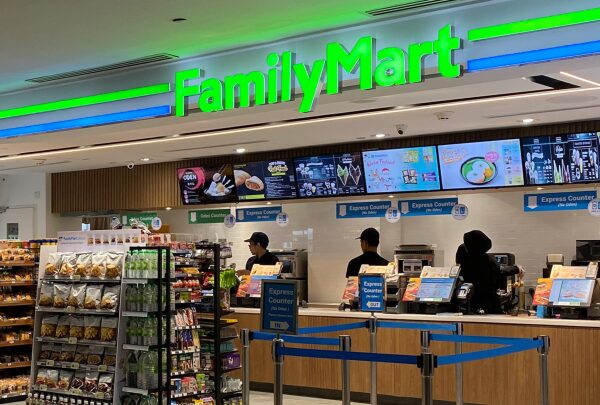
While not every item is halal, you can often find simple, safer options such as tuna or kombu onigiri, plain salads, boiled eggs, and packaged desserts in convenience stores. Just be sure to check the ingredient labels carefully, or use a translation app to confirm the contents.
Keep an eye out for official halal certification logos; some Japanese products now carry them.
Tips: You can also use the Halal Japan app to scan barcodes and verify whether packaged items meet halal standards.
5. Use translation tools or show key phrases
Don’t hesitate to use a translation app or keep a few key phrases on hand, such as “no pork” or “no alcohol” when speaking to restaurant staff. Most people in Japan are polite and willing to assist, especially if you ask respectfully.
6. Bring halal snacks

It’s always wise to bring some halal snacks from home, especially for situations where options might be limited. Whether you’re on a long train ride or exploring a remote area, having your own supply of halal-friendly snacks can be a real lifesaver.
Snacks like energy bars, nuts, instant noodles, or biscuits can keep you fueled and worry-free throughout your journey.
Want to plan your halal trip to Japan? Start your unforgettable Muslim-friendly adventure with Dina Travel today!
What Foods Are Halal in Japan?
Halal food might be limited in Japan overall, but you’ll be happy to know that many beloved Japanese dishes can still be enjoyed. In major cities, some restaurants even offer
halal-certified versions of these local favourites.
1. Ramen
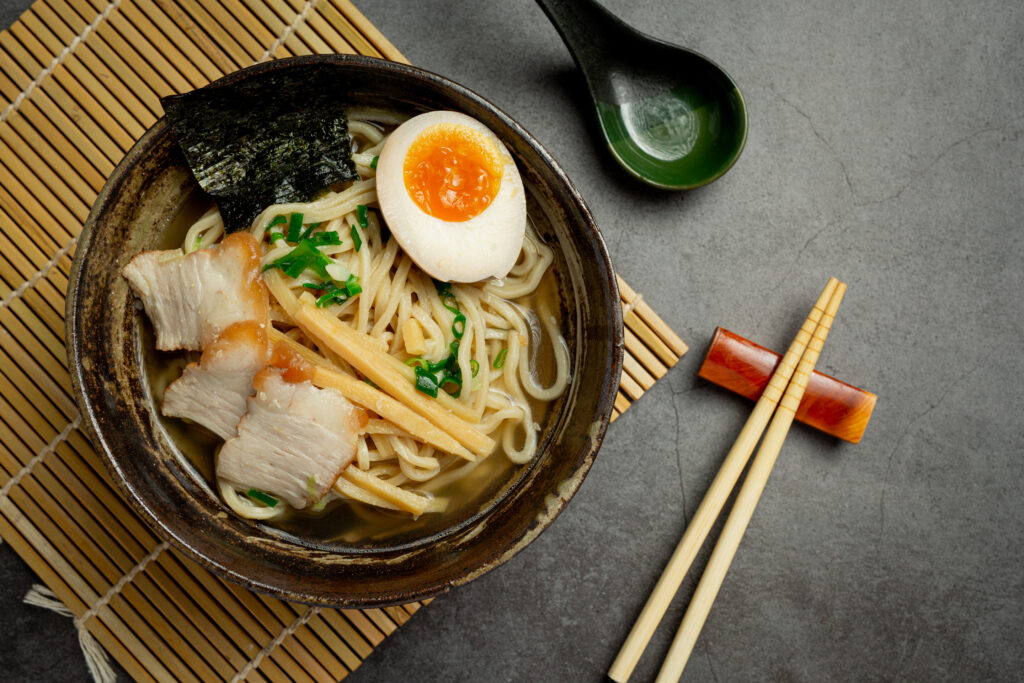
Considered a cultural staple with countless variations and dedicated shops across the country, ramen is one of Japan’s most iconic dishes. However, it’s traditionally made with either pork or chicken broth, which can be a concern for Muslim travelers.
Fortunately, many halal ramen shops in Japan now offer delicious alternatives made with chicken, seafood, or plant-based broths. In major cities like Tokyo and Kyoto, popular halal-certified chains such as Ayam-ya and Naritaya serve steaming bowls of ramen that you can enjoy with peace of mind.
2. Yakitori
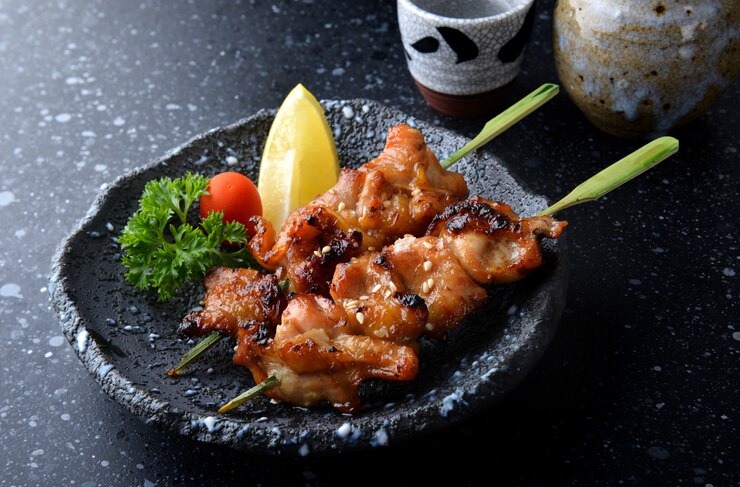
Yakitori, or grilled skewered chicken, is a popular Japanese street food often enjoyed at casual eateries and festivals. While traditional versions may use marinades containing mirin or sake, halal yakitori is prepared using soy-based sauces without alcohol.
These halal-friendly versions can be found at select certified restaurants such as Tsuki no Odori and Mokumoku, especially in major cities catering to Muslim travelers.
3. Tempura
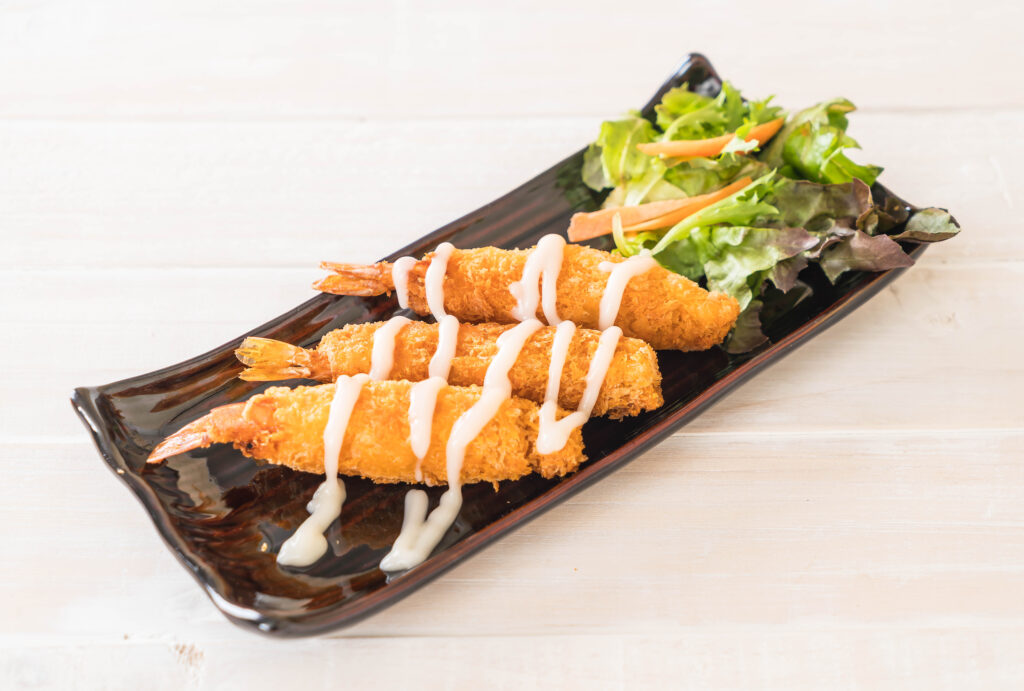
Tempura is a beloved Japanese dish made by deep-frying seafood or vegetables in a light, crispy batter. It’s often served with a dipping sauce, which may contain mirin or other alcohol-based ingredients, so it’s always best to check. Vegetarian tempura is easier to find and usually the safest option for Muslim travelers.
4. Bento Box
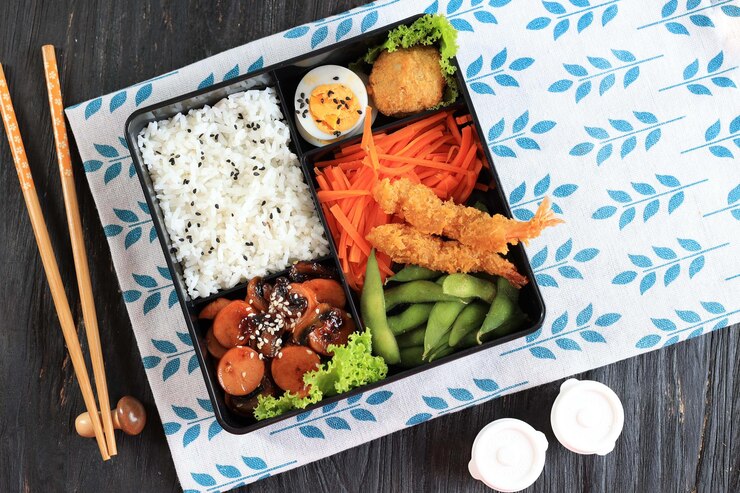
Bento boxes are convenient, pre-packed meals commonly found throughout Japan. For Muslim travelers, halal bento options are available in select locations, especially near airports, major train stations, and popular tourist areas.
They’re a great option for meals on the go, just be sure to check the packaging for halal labels or certification marks to ensure the food aligns with your dietary requirements.
5. Onigiri
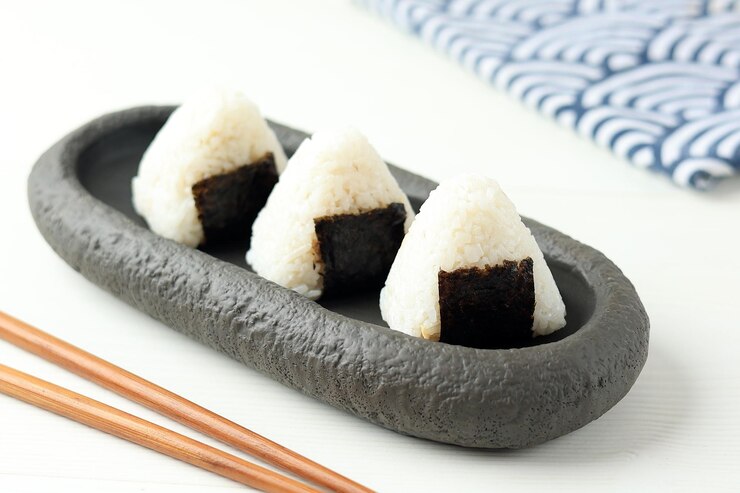
Onigiri, or Japanese rice balls, are a popular and convenient snack found in nearly every convenience store across Japan. For Muslim travelers, options like tuna mayo, kombu (kelp), or plain salted onigiri are generally safe choices.
Be sure to check the label or use a translation app to confirm the ingredients and verify that they are halal before buying.
6. Udon and Soba
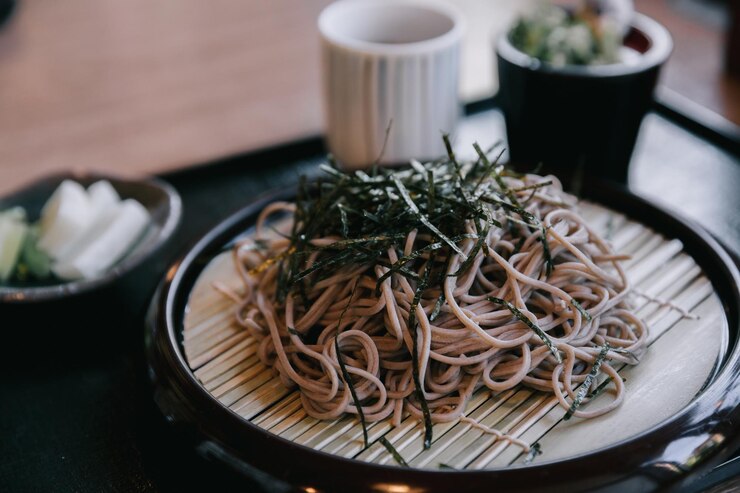
Udon and soba are two of Japan’s most popular noodle dishes. These noodles are made from wheat and buckwheat, respectively, and enjoyed both hot and cold. While the noodles themselves are typically halal, the concern lies in the broth, which may contain mirin (sweet rice wine) or pork-based dashi.
For Muslim travelers, vegetarian versions are usually a safer choice. When in doubt, it’s best to ask the staff about the ingredients used in the soup base.
7. Japanese Curry
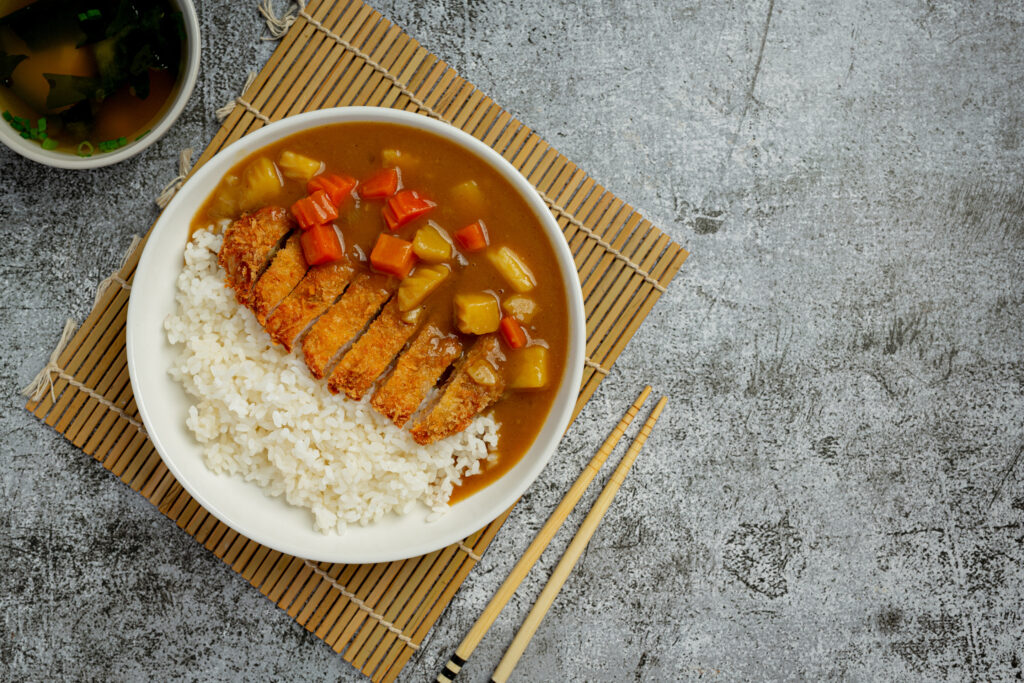
Japanese curry is a hearty and comforting dish made with meat, potatoes, carrots, and onions in a thick, mildly spiced sauce. Many halal restaurants now serve chicken or beef curry prepared with halal-certified ingredients.
8. Sushi
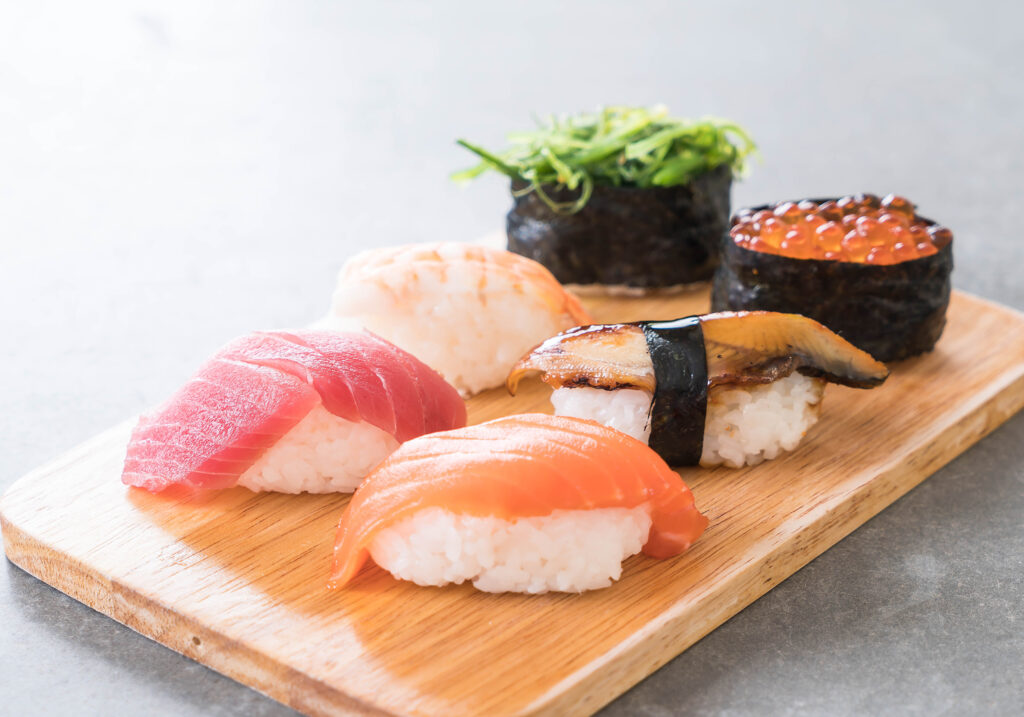
Sushi is one of Japan’s most iconic dishes, and the good news is that some types can be enjoyed by Muslim travelers. Options like vegetable maki, tamago (sweet egg), or cooked seafood such as prawn and crab are usually safe choices.
However, it’s important to check that the sushi rice and soy sauce don’t contain mirin or sake, which are commonly used in traditional preparation. Halal restaurants like Asakusa Sushi-ken in Tokyo and Matsuri in Osaka prepare their sushi rice using vinegar instead of mirin, offering a safer and more inclusive option for Muslim diners.
9. Shabu – Shabu
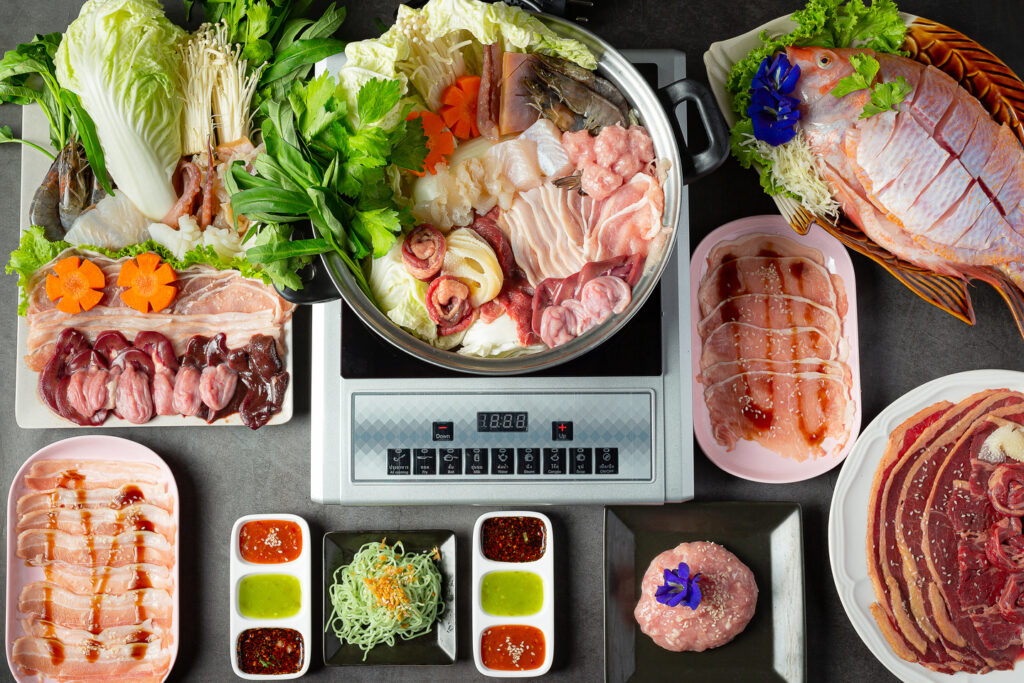
Shabu-shabu is a popular Japanese hotpot dish where thin slices of meat and vegetables are briefly swished in a pot of boiling broth and then dipped in sauce. Today, halal-certified restaurants in Japan offer shabu-shabu made with halal wagyu beef, chicken, or seafood, along with alcohol-free dipping sauces.
Look out for halal options in places like Yoshiya Arashiyama (Kyoto) and Matsuri (Osaka), where the whole experience can be enjoyed without compromising on dietary needs.
10. Karaage
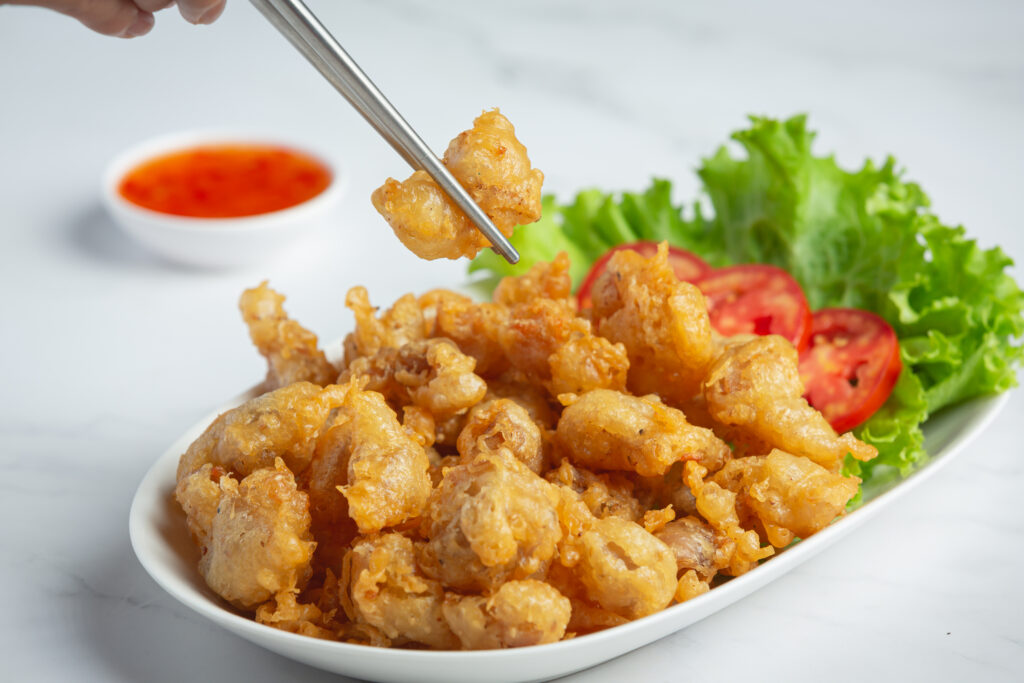
Karaage, or Japanese-style fried chicken, is a beloved comfort food known for its crispy texture and juicy flavor. Halal versions are typically marinated in soy sauce, garlic, and other alcohol-free ingredients, and made with halal-certified chicken, allowing Muslim travelers to enjoy this classic dish without concern.
11. Okonomiyaki
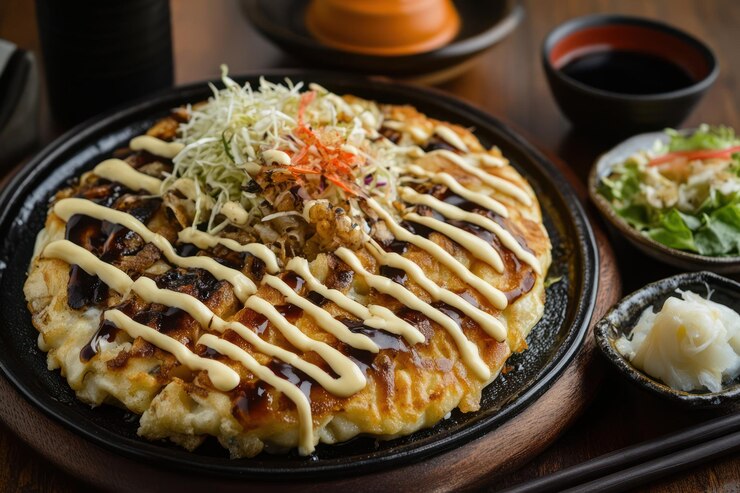
Okonomiyaki is a savory Japanese pancake made from a batter of flour, cabbage, and eggs, often topped with meats, seafood, and a variety of sauces. It’s a popular street food across Japan and can be customized for Muslim travelers using halal-certified meats and alcohol-free sauces at select restaurants.
From city lights to mountain sights, discover Japan the halal way!
Halal Japanese Restaurants
Finding authentic Japanese food that aligns with halal dietary requirements might seem challenging at first, but thanks to Japan’s growing awareness of Muslim travelers, more restaurants are stepping up to the plate. With this list of Muslim friendly and halal-certified restaurants, there’s no need to miss out on Japan’s rich culinary experiences.
1. Ayam-YA
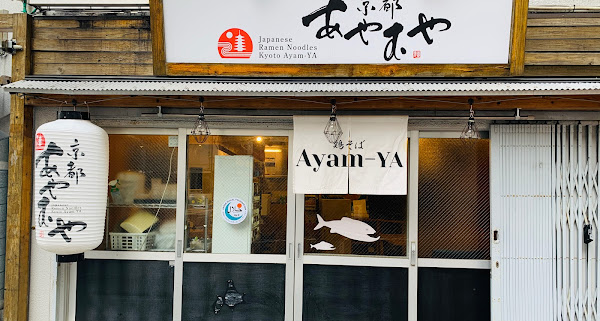
Ayam-YA is a well-known halal ramen chain, popular among both locals and Muslim travelers. With outlets in Tokyo and Kyoto, it serves rich, flavorful bowls of ramen made with halal-certified chicken and no alcohol-based ingredients.
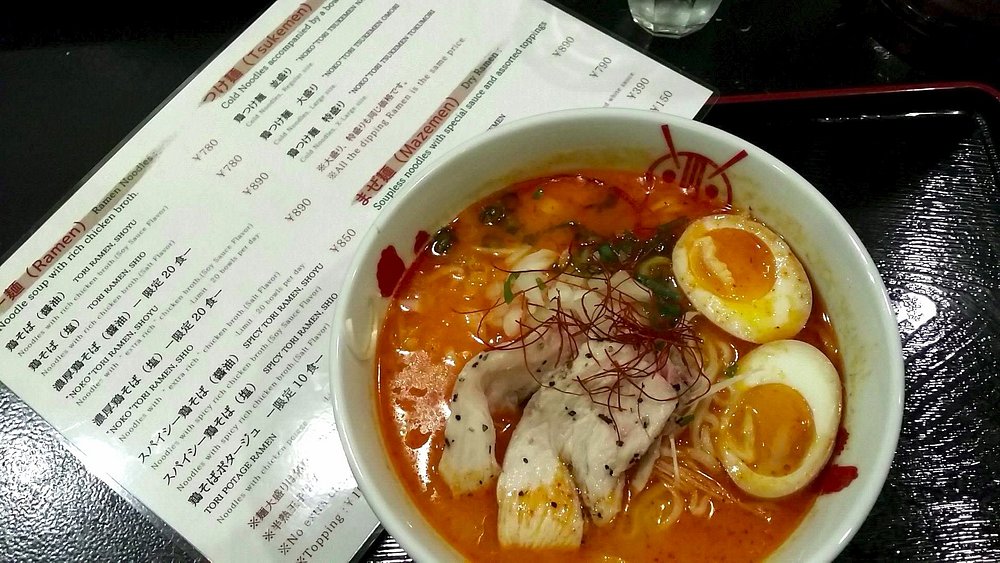
Their signature spicy ramen and creamy chicken broth are crowd favorites. For something lighter and refreshing during hot weather, try the tsukemen, cold dipping noodles served with a flavorful broth on the side. If you’re craving a stronger kick, you can always go for the spicier version to turn up the heat.
Ayam-YA is certified by the Japan Islamic Trust, making it a trusted stop for authentic and worry-free Japanese comfort food. Plus, it’s conveniently located just steps from one of Tokyo’s major transport hubs, Ueno Station, and only a 2-minute walk from Masjid Assalam Okachimachi, so you can easily stop by for prayers.
Address: 2-1-11 Mikatakonyacho, Shimogyo-ku, Kyoto City, Kyoto 600-8238, Japan
Contact details: +81 75-344-1456
Price Range: ¥850 to ¥1,020 per person
2. Matsuri
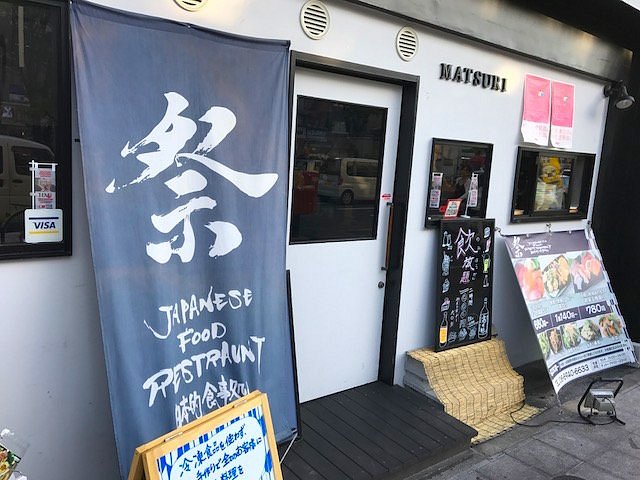
Located in the heart of Osaka, Matsuri is a popular halal-certified restaurant that offers an authentic taste of Japanese home-style dishes, all prepared in a Muslim-friendly kitchen.
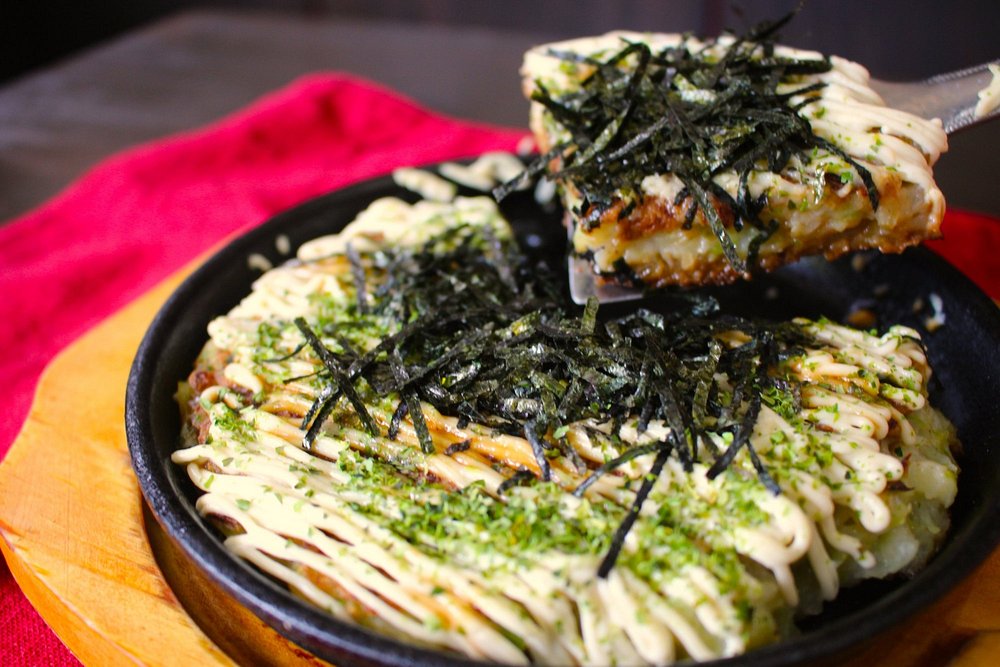
From takoyaki and okonomiyaki to ramen and sushi, Matsuri brings classic Japanese comfort food to the table without compromising on halal requirements.
What makes Matsuri stand out is its warm hospitality and inclusive menu. The staff are well-versed in Muslim dietary needs, and every dish is prepared using halal-certified ingredients.
Additionally, Matsuri goes the extra mile by providing a prayer space upon request, making it a truly convenient and welcoming spot for Muslim travelers.
Address: 3-27-17 Yoshino, Fukushima-ku, Osaka-shi, Osaka, 553-0006, Japan
Contact details: +81 6-6940-6633
Price Range: ¥1,000 to ¥2,000 per person
3. Halal Wagyu Yakiniku PANGA

Located in Tokyo’s Taito district, Halal Wagyu Yakiniku PANGA is a must-visit for meat lovers looking to savour authentic halal-certified Japanese barbecue.
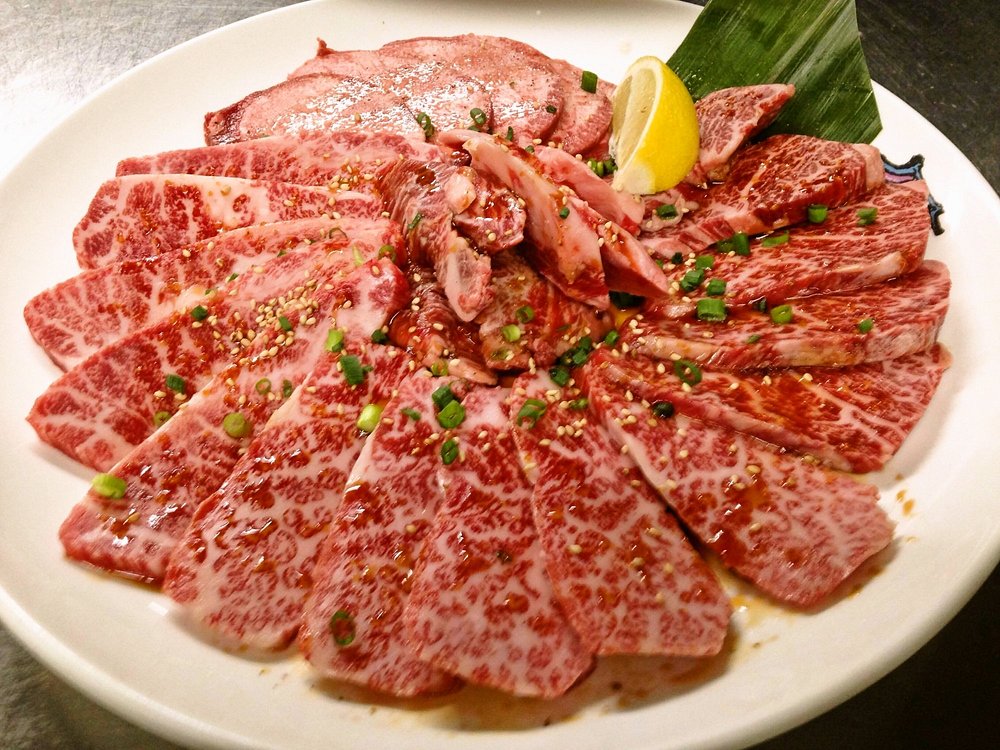
The restaurant is renowned for its top-quality A5-grade Japanese Black Wagyu, which is carefully sourced from Iwate Prefecture. Each cut is prepared with precision and served fresh, offering diners a luxurious yet diverse selection.
The restaurant’s commitment to halal standards is evident through its certification by the Japan Halal Foundation, guaranteeing that all meat and seasonings comply with Islamic dietary laws.
To add on, the restaurant also provides an English menu and has English-speaking staff, ideal for international visitors who may struggle with Japanese menus..
Address: 3-27-9 Taito, Taito City, Tokyo 110-0016, Japan
Contact details: +81 3-3839-8929
Price range: ¥2,500 to ¥5,500 per person
4. Honke Tankuma Honten
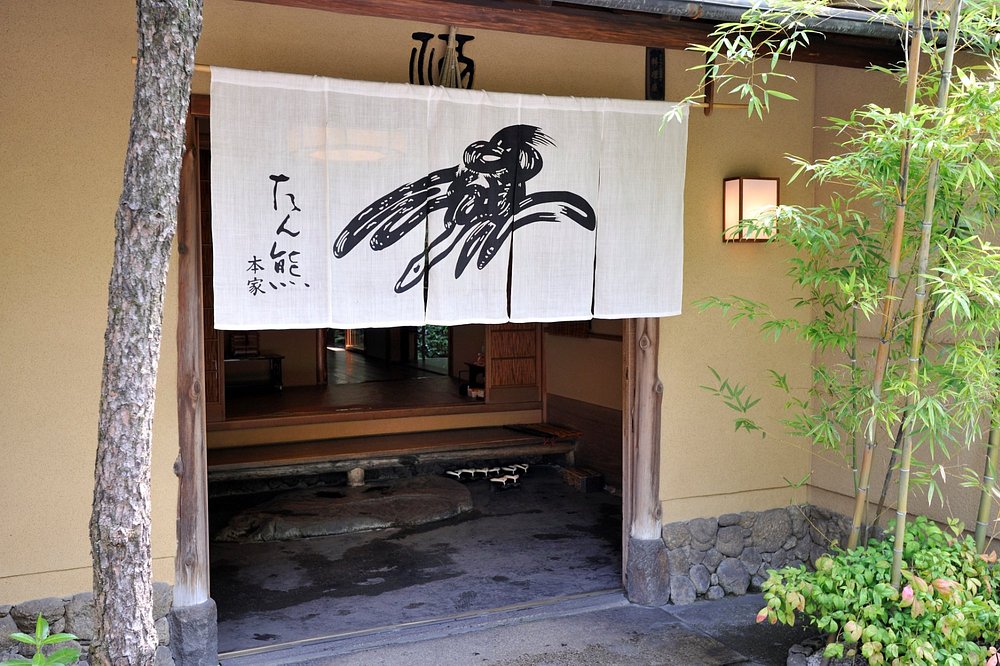
Honke Tankuma Honten is a prestigious Michelin-starred restaurant located along the tranquil Kamo River in Kyoto. Established in 1928, this esteemed dining establishment has been serving exquisite Kyoto-style kaiseki cuisine for nearly a century.
In 2014, it received halal certification from the Kyoto Council for Sharia and Halal Affairs, making it a pioneer in offering halal kaiseki experiences in Japan.
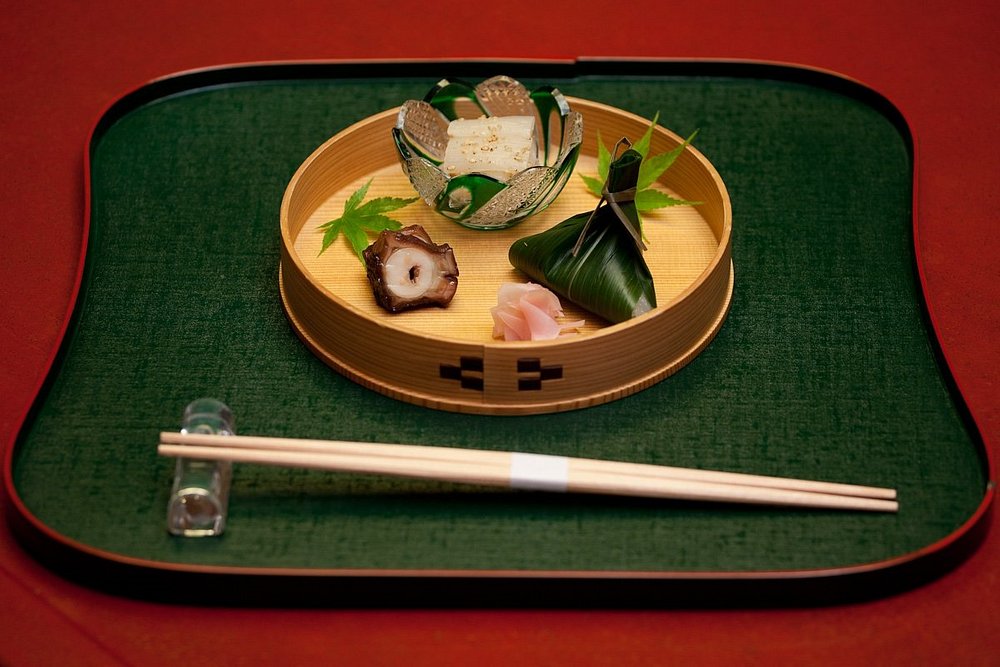
It offers meticulously crafted halal kaiseki courses featuring premium ingredients such as charcoal-grilled halal wagyu beef and Awa Odori chicken, a JAS-certified jidori chicken known for its rich flavour and tender texture
For those seeking variety, the restaurant offers multi-course meals that include tempura, stewed vegetables, miso soup, and seasonal fruits, all prepared without the use of pork or alcohol.
To ensure a welcoming experience for Muslim diners, Honke Tankuma Honten has also installed a prayer space within its premises. Reservations are recommended, especially for halal and vegan options, which must be requested at least two days in advance.
Address: 168, Izumiya-cho, Kiyamachi-dori Bukkoji-sagaru, Shimogyo-ku, Kyoto 600-8014, Japan
Contact details: +81 50-3628-1645
Price range: ¥22,000 to ¥44,000 per person
5. Asakusa Sushi Ken
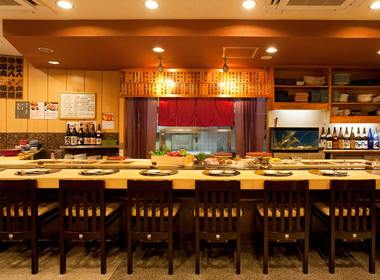
Tucked away in Tokyo’s historic Asakusa district, Asakusa Sushi Ken proudly holds the title of Japan’s first halal-certified sushi restaurant.
Certified by the Japan Halal Foundation, the restaurant ensures that all ingredients, from soy sauce to pickled ginger, strictly adhere to Islamic dietary laws, providing Muslim diners complete peace of mind.
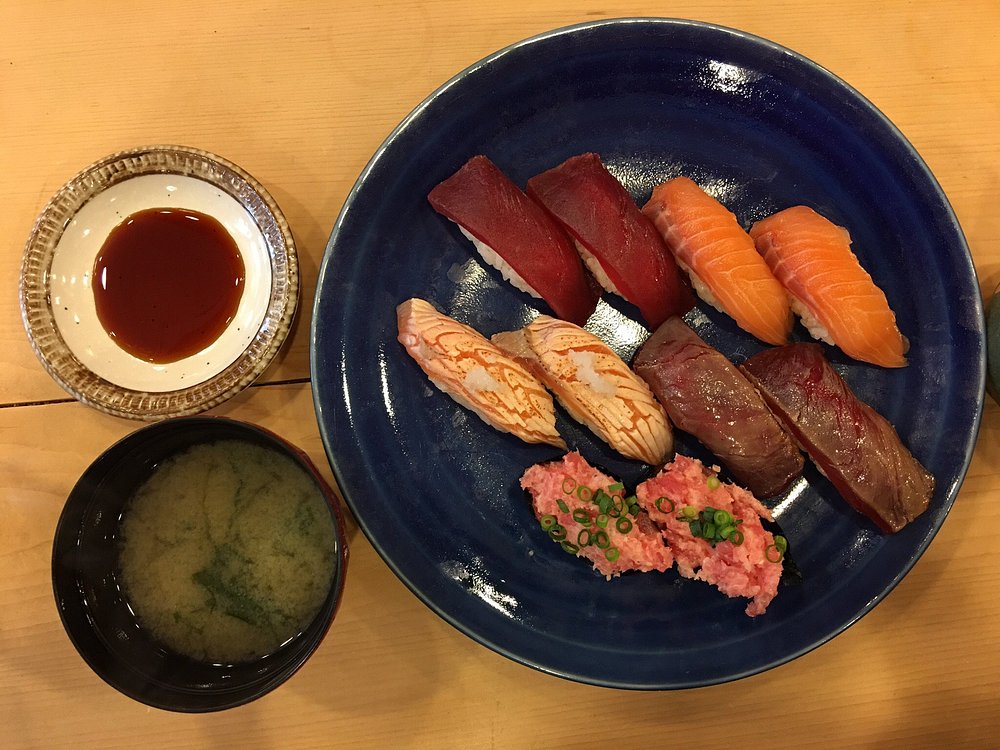
The menu offers a wide variety of fresh, high-quality sushi and sashimi, including popular sets like Jō Nigiri, crispy tempura, and even halal wagyu beef. Vegetarian options such as tofu nigiri and tamagoyaki (sweet omelette) are also available, making it easy for diners with different dietary preferences to enjoy a traditional Japanese meal
Just a 1-minute walk from Tsukuba Express Asakusa Station, Asakusa Sushi Ken offers a warm and hassle-free dining experience for international visitors, complete with English-speaking staff and menus to ensure easy communication and ordering.
Address: 2-11-4 Asakusa, Taito-ku, Tokyo 111-0032, Japan
Contact details: +81 3-5246-6547
Price Range: ¥1,540 to ¥3,300 per person
6. Yoshiya Arashiyama

Amid the picturesque Arashiyama district of Kyoto, Yoshiya Arashiyama offers an authentic, halal-certified washoku dining experience. With over 70 years of history, this esteemed restaurant blends the elegance of Kyoto cuisine with Muslim-friendly practices, certified by the Kyoto Council for Sharia and Halal Affairs.
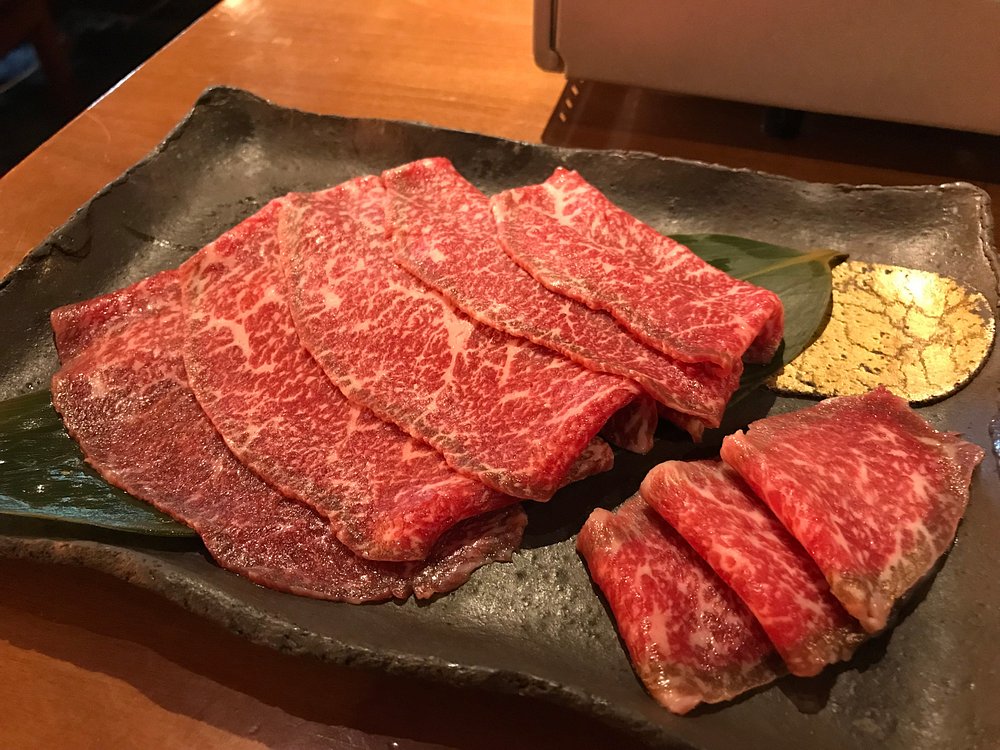
Yoshiya’s menu features a variety of halal dishes, including the Halal Matsukajo Bento, which includes tempura, kakiage (vegetable fritters), and grilled salmon with perilla leaf. Another popular choice is the Halal Spicy Karaage Set, featuring crispy fried chicken served with rice and tofu.
For those seeking a more interactive experience, Yoshiya also offers halal wagyu shabu-shabu, where diners cook thin slices of premium beef in a savoury broth at their table.
To further accommodate Muslim guests, Yoshiya provides a dedicated prayer room, complete with prayer mats and a wudu (ablution) facility featuring a traditional bamboo water tap.
Address: 31 Sagatenryuji Tsukurimichicho, Ukyo-ku, Kyoto 616-8384, Japan
Contact Number: +81 75-871-0448
Price Range: ¥1,500 to ¥5,250 per person
Halal Non-Japanese Restaurants
If your taste buds are craving something beyond Japanese cuisine but you’re mindful of halal requirements, worry not. Japan is also home to a growing number of halal-certified restaurants offering a wide range of global flavours.
1. Nirvanam
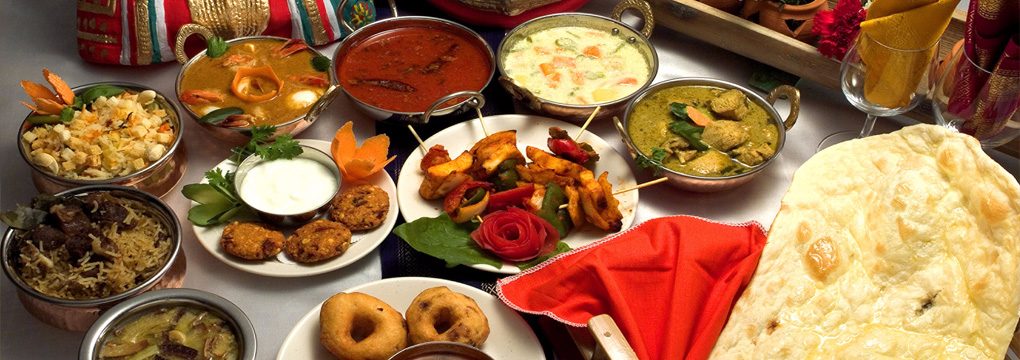
Nirvanam stands as a beacon of authentic South Indian cuisine, offering a delightful array of halal-certified dishes that cater to diverse palates. With multiple branches across Tokyo including Kamiyacho, Ariake, and Ginza, Nirvanam has earned a strong reputation for its commitment to quality, authenticity, and Muslim-friendly dining.
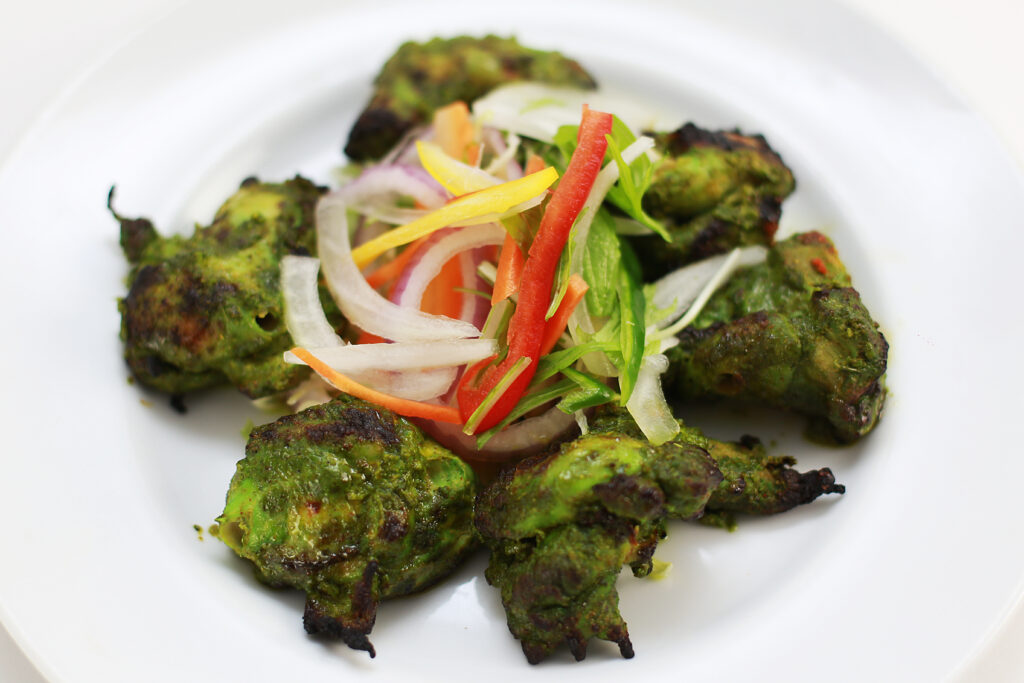
The menu features a rich tapestry of flavours from various regions of South India. Signature dishes include masala dosa, Kerala-style chicken curry, Malabar shrimp fry, and Hyderabadi biryani. Vegetarian guests can enjoy hearty options like vegetable kurma, dal fry, and paneer masala, all prepared using halal-certified ingredients.
To further accommodate Muslim diners, Nirvanam provides prayer spaces and ensures that all utensils and kitchenware are used exclusively for halal food preparation offering peace of mind alongside flavorful, comforting meals.
Address: 2nd Floor, Kyuei Building, 3-18-21 Toranomon, Minato-ku, Tokyo 105-0001, Japan
Contact details: +81 3-3433-1217
Price Range: ¥1,000 to ¥2,000 per person
2. Cafe Istanbul
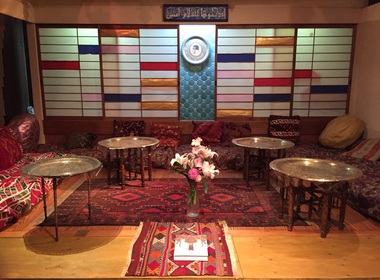
Tucked away in Kyoto’s historic Higashiyama district, Cafe Istanbul offers a warm and inviting atmosphere reminiscent of a traditional Turkish café. Just a 2-minute walk from Gion-Shijo Station, this charming eatery provides a convenient stop for travelers exploring the cultural heart of Kyoto.
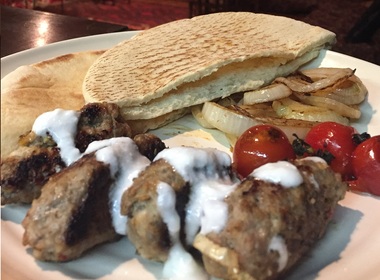
The menu features authentic Turkish dishes, with the chicken kebab being a standout favorite. Marinated overnight with a blend of Turkish spices, the kebab delivers a flavorful experience that transports diners straight to Istanbul.
Complementing the main courses are side dishes like homemade hummus, offering a creamy and rich taste, and traditional beverages such as Turkish coffee, perfect for rounding off the meal.
Address: 2F, 138 Tominaga-cho, Higashiyama-ku, Kyoto 605-0078
Contact details: +81-90-8388-2062
Price range: ¥1,500 to ¥3,000 per person
3. Malaychan
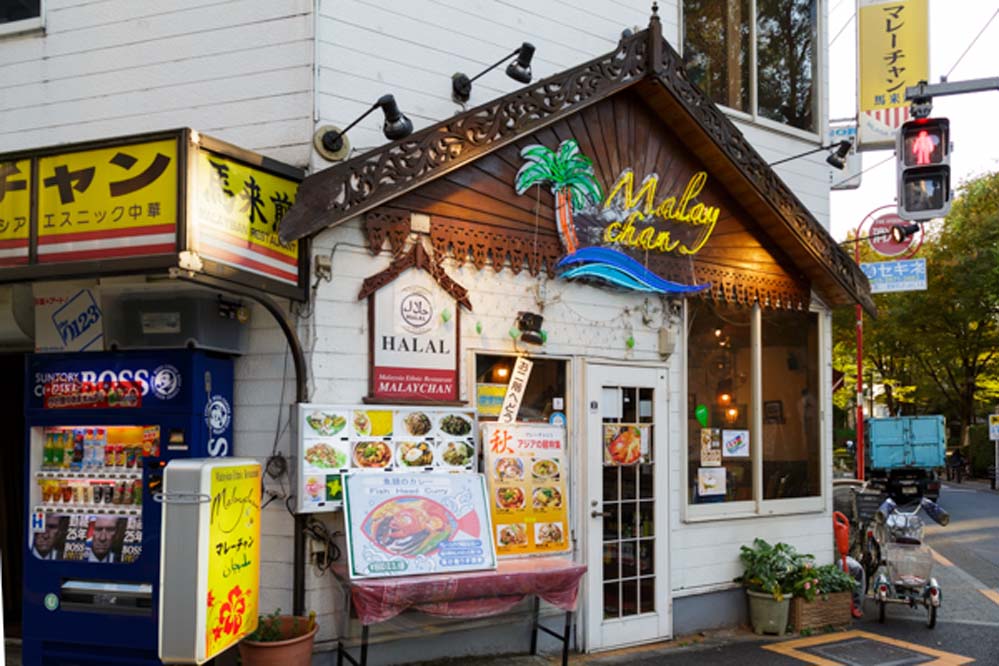
Established in 1986, Malaychan holds the distinction of being Japan’s first halal-certified Malaysian restaurant. Located in the vibrant Ikebukuro district of Tokyo, this eatery has been a culinary haven for both locals and international visitors seeking authentic Malaysian flavors.
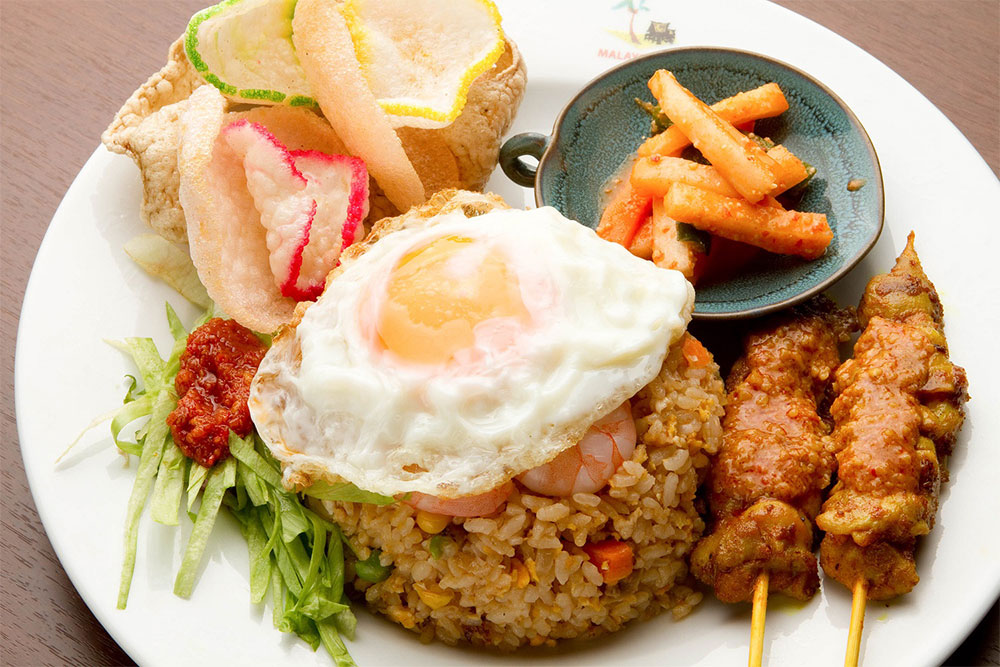
Malaychan’s menu showcases the vibrant diversity of Malaysia’s culinary heritage, featuring dishes influenced by Malay, Chinese, and Indian traditions. Signature offerings include nasi lemak, satay, curry laksa, and tempeh sambal, all crafted using halal-certified ingredients.
The restaurant also caters to various dietary needs, offering vegetarian, vegan, and gluten-free options. It’s also well-known for its authentic flavours with the owner and staff frequently travelling to Malaysia to source ingredients and refine recipes, ensuring diners enjoy a truly genuine Malaysian taste.
Address: 3-22-6 Nishi-Ikebukuro, Toshima-ku, Tokyo 171-0021
Contact details: +81-3-5391-7638
Price range: ¥1,000 to ¥2,000 per person
4. Silk Road Tarim
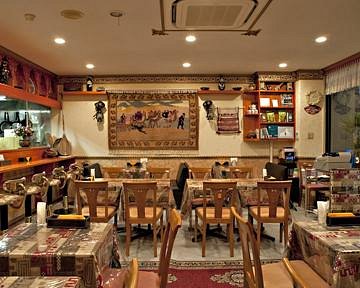
Established in 2010, Silk Road Tarim Uyghur Restaurant offers a genuine taste of Uyghur cuisine, deeply rooted in the rich cultural heritage of the Silk Road.
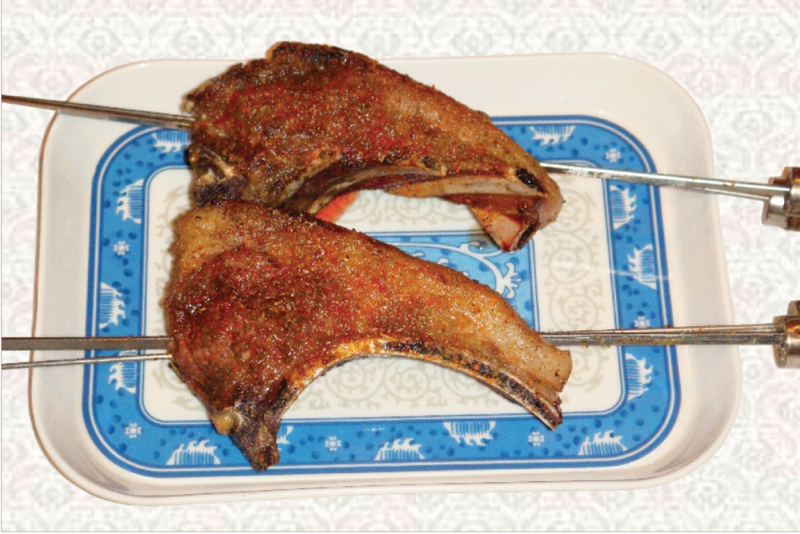
The menu features a variety of traditional dishes, including the signature Talim Laghman, hand-pulled noodles topped with a savoury tomato-based sauce, lamb, and vegetables.
Other popular options include Shishikawapu (spiced lamb skewers), Tugure (handmade dumplings), and Polo (a fragrant rice pilaf with tender meat and spices). A prayer space is also available, making the restaurant a comfortable and convenient choice for Muslim diners.
Address: 1F, Nishi-Shinjuku Bar Building, 3-15-8 Nishi-Shinjuku, Shinjuku-ku, Tokyo 160-0023
Contact details: +81-3-6276-7799
Price range: ¥1,000 to ¥4,999 per person
Explore Halal Food in Japan, One Bite at a Time!
From Tokyo’s bustling streets to Kyoto’s serene temples, Japan is full of delicious, halal-certified culinary experiences waiting to be discovered. Whether you’re after authentic wagyu, halal ramen, or comfort food from back home, Muslim-friendly dining is more accessible than ever.
Let Dina Travel plan your perfect halal-friendly trip, complete with curated meals, prayer-friendly stops, and culturally enriching moments. Because your faith and your love for travel should always go hand-in-hand. Let us help you explore the world on your terms, from specially curated stays to enriching spiritual journeys..
Frequently Asked Questions (FAQ)
Yes, Japan Airlines (JAL) provides halal-certified meals on all international flights departing from Japan. These meals are certified by the Japan Islamic Trust (JIT) and meet Islamic dietary guidelines.
No, major fast food chains such as KFC, McDonald’s, and Pizza Hut in Japan do not offer halal-certified food.
While some non-meat items like salads or certain desserts may not contain haram ingredients, cross-contamination risks exist due to shared cooking equipment. Therefore, it’s advisable for Muslim travelers to seek out dedicated halal-certified restaurants or Muslim-friendly establishments when dining in Japan.
Halal food in Japan can be slightly more expensive than regular meals, but it’s generally affordable, especially when you know where to go. The slightly higher price is usually due to imported halal ingredients, certification processes, and smaller supply chains.
However, look for Muslim-friendly or vegetarian restaurants if you’re on a tighter budget as they often have halal options at lower prices.
“Muslim-friendly” usually means no pork or alcohol is used, but it may not guarantee full halal compliance. If you’re strict about halal, look for official certification or ask detailed questions about ingredients, meat sourcing, and kitchen practices.
Some large supermarkets or international stores (like Gyomu Super, Seiyu, or Nissin World Delicatessen) in big cities sell halal-certified meat, sauces, and snacks. You can also find halal groceries in Muslim-run shops or online within Japan.

